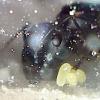- Formiculture.com
- Forums
- Gallery
- Members
- Member Map
- Chat

Can someone please enlighten me about what you feed your ants?
Started By
kevinirvinryann
, Feb 7 2015 4:14 PM
7 replies to this topic
#1
 Offline
-
Posted February 7 2015 - 4:14 PM
Offline
-
Posted February 7 2015 - 4:14 PM
I'm interested in seeing how you all feed your ants! Please share your ants diet
#2
 Offline
-
Posted February 7 2015 - 4:35 PM
Offline
-
Posted February 7 2015 - 4:35 PM
It's best to browse the ant journals forum. Go through those journals; they teach you a lot. I learned a lot from reading others' journals.
But to sum it up, ants in general want sugar and protein. Sugar for energy. Protein for brood and egg production for their queens. Unless it is harvester ants species, almost all ants will generally accept sugar rich water. And, again, unless it's harvester ants, almost all ants will accept freshly dead insects.
There are also commercial products that combine both sugar and protein together in one package such as Byformica's Blue 100, Aqua 300, and other series. (google them), Tar Heel ant "complete ant juice", and some UK sellers provide "protein jelly".
Almost all die-hard ant keepers tend to culture their own insects for ants to eat.
Easy to culture insects are -
1. Fruit Fly <- This insect is almost universally accepted by ants, even by harvester ants
2. Mealworm <- Amusingly easy to culture
3. Wax worm
etc etc
Edit: Took a moment to dig out the URL but check out Crystal's insect breeding how-to for more info.
http://www.formicult...ts-and-feeders/
Edited by dean_k, February 7 2015 - 4:40 PM.
#3
 Offline
-
Posted February 7 2015 - 7:02 PM
Offline
-
Posted February 7 2015 - 7:02 PM
I second dean's advice. Go read through the journals for more detailed information but I'll give you a quick run-down of what I generally do.
I feed all my colonies an ant jelly that I make myself. It is a variation of the classic Bhatkar-Whitcomb diet well as the A. Dussutour and S.J. Simpson diet which also contains preservatives and additional proteins to inhibit the growth of mold. Right now, I've been experimenting with different versions to test receptivity and larvae growth. Unfortunately, I do not have sufficient colonies to conduct a controlled study. Neither do I have the time to do so. Hence, the best I can do is basically feed a colony on one version for a week before weighing their larvae,pupae and workers. Of course, taking into account the different castes of workers is important as well as the development stage of the larvae in question.
So far, all my colonies have been the most receptive to the version with 0.12% sodium benzoate. However, I've discovered that my Odontomachus prefers 0.02% - 0.06%. Not sure why but they are carnivorous ants unlike other generalist species so perhaps there's something to do with their diet. Also, it doesn't mold even after a week in a high humidity environment of around 80% RH.
Granted, I do supplement larger colonies with insects but in my experience, keeping them on this diet is a reliable way of getting the colony through the founding stage. Insects are also messier and cause mold. Plus, I feed all my founding queens this diet especially the starving ones. Even claustral queens eat readily when they have the chance. This has resulted in larger and heavier founding broods. For instance, one of my Solenopsis geminata queens successfully raised 23 workers when fed. Another unfed one only raised 16 workers. Of course, this is not a properly conducted study since I do not have a sufficient representative sample but again this is from experience and experimentation.
Here's a screengrab of a timelapse I made of wild Paratrechina longicornis enjoying a snack of Orange V3

Edited by Etherwulf, February 14 2015 - 10:21 PM.
#4
 Offline
-
Posted February 8 2015 - 6:18 AM
Offline
-
Posted February 8 2015 - 6:18 AM
Thanks this has been a great help!
#5
 Offline
-
Posted February 8 2015 - 11:21 AM
Offline
-
Posted February 8 2015 - 11:21 AM
If the General section the pinned thread is the List of Handy Links. This page has lots of links. Some may be of interest to you.
I would link it, but this computer is not letting me.
"Always do right. This will gratify some people, and astound the rest." -- Samuel Clemens
#6
 Offline
-
Posted February 8 2015 - 5:57 PM
Offline
-
Posted February 8 2015 - 5:57 PM
Sugar water, whatever Formula I have on hand from Byformica, honey water, mealworms, sometimes food from my plate (eggs or chicken usually), jam.
Pretty much I give them everything and repeat giving it to them if they like to eat it. I find different species likes to eat different things.
#7
 Offline
-
Posted February 25 2015 - 3:19 AM
Offline
-
Posted February 25 2015 - 3:19 AM
I fed my ants with honey, small insects such as mosquitoes, fruit flies, crickets and for some species, seeds.
#8
 Offline
-
Posted February 25 2015 - 10:23 AM
Offline
-
Posted February 25 2015 - 10:23 AM
Preferred Foods by Species: http://www.formicult...ood-by-species/
How to culture various insects: http://www.formicult...ts-and-feeders/
Personally for me it depends if it is winter and I have snow, or if it is summer and I can catch insects. I live in the country so no one out here sprays for insects.
Year round staples:
Hummingbird nectar (my ants decided that they don't like honey)
Mealworms
Flightless Fruit Flies
Summer:
Almost any insect - I am cautious with moths (some wing dust can harm ants), centipedes, and anything that can pack a large bite.
I commonly feed frozen spiders, various flies and winged insects that get trapped in the greenhouse, grasshoppers, catepillars, etc. I often freeze wild insects to carry my colonies through the winter.
Winter: I have snow and -35C temperatures so no wild insects.
I rely on stapes like Hummingbird Nectar, mealworms, crickets, flightless fruit flies, and table scraps like egg yolk, cooked chicken, fruit, etc.
Any insects that tried to overwinter inside become ant snacks.
"Always do right. This will gratify some people, and astound the rest." -- Samuel Clemens
1 user(s) are reading this topic
0 members, 1 guests, 0 anonymous users

















